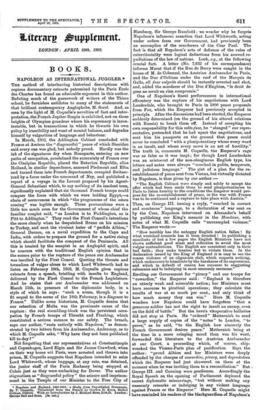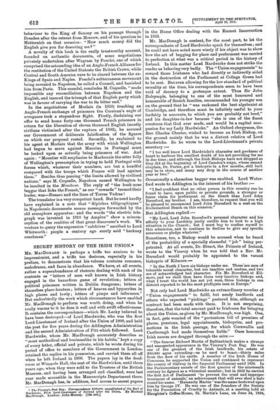BOOKS.
NAPOLEON AS INTERNATIONAL JUGGLER.* THE method of interleaving historical descriptions with copious documentary extracts patronised by the Paris Ecole des Chartes has found an admirable exponent in this author. Refuting much of the guesswork of writers of the Thiers school, he furnishes antidotes to many of the statements of that brilliant contemporary Anglophobe, M. Sorel. And, as seen by the light of M. Coquelle's novelties of fact and inter- pretation, the French Jupiter Scapin is exhibited, not on those heights of Olympian grandeur where his supremacy is incon- testable, but in transactions in which he thwarts his own policy by irascibility and want of mental balance, and degrades himself by vulgarities of language and behaviour.
In March, 1802, the Addington Cabinet concluded with France at Amiens the " disgraceful " peace of which Sheridan said every one was glad, but nobody proud. Hardly was the ink of the signatures dry when Bonaparte, entering on new paths of usurpation, proclaimed the suzerainty of France over the Cisalpine Republic, placed the Batavian Republic, alias Holland, in similar dependence, annexed Piedmont and Elba and turned them into French departments, occupied Switzer- land by a force under the command of Ney, and published a report of a voyage in the Levant prepared by his Agent. General Sebastiani which, to say nothing of its insolent tone, significantly explained that six thousand French troops could conquer the force with which we were holding Egypt,—a chain of occurrences in which "the programme of the miten coming" was legible enough. These provocations were a little too much even for the Government of whose chief the familiar couplet said, "as London is to Paddington, so is Pitt to Addington." They read the First Consul's intentions the more clearly when he despatched Brune on his mission to Turkey, and sent the virulent hater of " perfide Albion," General Decaen, on a naval expedition to the Cape and India, with orders to prepare the ground for a native rising which should facilitate the conquest of the Peninsula. All this is treated by the essayist in an Anglophil spirit, and be concurs with the traditional English opinion that in the scenes prior to the rupture of the peace our Ambassador was insulted by the First Consul. Quoting the threats and tornadoes of vulgar abuse to which Lord Whitworth had to listen on February 18th, 1803, M. Coquelle gives copious extracts from a speech, bristling with insults to England, delivered by the First Consul to the French Legislature. And he states that our Ambassador was addressed on March 11th, in presence of the diplomatic body, in a style of which he says : "such a scene, though it is a fit sequel to the scene of the 18th February, is a disgrace to France." Unlike some historians, M. Coquelle denies that our retention of Malta was the proximate cause of the rupture; the real stumbling-block was the persistent occu- pation by French troops of Utrecht and Flushing, which constituted a serious menace to our safety. The breach, says our author, "rests entirely with Napoleon," as demon- strated by two letters from his Ambassador, Andreossy, as to which M. Coquelle asks, "Why have they not been published till to-day ?"
Not forgetting that our representatives at Constantinople and Copenhagen, Lord Elgin and Sir James Crawford, when on their way home yid Paris, were arrested and thrown into prison, M. Coquelle suggests that Napoleon intended to seize Lord Whitworth, whose baggage, at any rate, wns detained, the junior staff of the Paris Embassy being stopped at Calais just as they were embarking for Dover. The author stigmatises as "disgraceful policy" the seizure and imprison- ment in the Temple of our Minister to the Free City of
• Napoleon and England, 1803-1813: a Study from Unpublished Documents. By P. Coquelle. Translated from the French by Gordon D. Knox, Balliol College, Oxford. With an Introduction by J. Rolland Bose, Litt.D. London; George Bell and Sons. [5s. net.]
Hamburg, Sir George Rumbold : we wonder why he forgets Napoleon's infamoua assertion that Lord Whitworth, acting under orders from our Government, had previously been an accomplice of the murderers of the Czar Paul. The fact is that all Napoleon's acts of defiance of the rules of exterritoriality were logical deductions from his avowed re- pudiations of the law of nations. Look, e.g., at the following crucial fact. A letter (No. 7,632 of his correspondence) informs Murat that if the Due de Berry were caught in the house of M. de Cobenzel, the Austrian Ambassador in Paris, and the Due d'Orleans under the roof of the Marquis de Gallo, all four culprits should be instantly arrested and shot, and, added the murderer of the Due d'Enghien, "le droit de gene no serait en rien compromis."
One of Napoleon's finest performances in international effrontery was the rupture of his negotiations with Lord Lauderdale, who brought to Paris in 1806 peace proposals from Fox, which the Emperor had previously accepted in principle. After the discussions had been started, the Emperor suddenly determined (on the ground of his altered relations with Russia) to break them off. Instead of accepting his own responsibility for this volte-face, he " slanged " our repre- sentative, pretended that he had upset the negotiations, and sent him his passports on the ground that peace could never be concluded "with a plenipotentiary whose every word is an insult, and whose every move is an act of hostility."
The truth is, comments M. Coquelle, the Emperor's rage- was as false as it was inept ; for though Lord Lauderdale was an aristocrat of the non-oleaginous English type, his letters and notes were always "couched in polite, temperate, and judicious language." The gist of a plan for the re- establishment of peace sent from Vienna, but virtually dictated by Napoleon, is thus given by our author :— "The English Cabinet were simply and solely to accept the offer which had been made them to send plenipotentiaries to Paris to listen humbly to the conditions the Emperor would pro- pose for the re-establishment of peace, or the war with France was to be continued and a rupture to take place with Austria."
Then, on George III. issuing a reply, "couched in correct and courteous" language, to a declaration of war sent us by the Czar, Napoleon intervened on Alexander's behalf by publishing our King's memoir in the .111Oniteur, with notes of what M. Coquelle calls "unexampled violence." The Emperor wrote :— "How terribly has the unhappy English nation fallen ! By what wretched counsels has it beon directed ! In publishing a manifesto of but a few pages the English Ministers have not shown sufficient good sense and reflection to avoid the most vulgar contradictions. The English are consistent only in their bad faith ; they make treaties but to violate them. In tho declaration issued by the King of England it is easy to see the coarse violence of an oligarchic club, which respects nothing, which endeavours to humiliate by the harshness of its expressions, and which in default of reason has recourse to suggesting calumnies and to indulging in most unseemly sarcasms."
Reviling our Government for "piracy" and our troops for "cowardice," the Emperor said : "England is therefore an utterly weak and miserable nation; her Ministers must have recourse to piratical operations ; they calculate the results of war at so much per cent., and only think• of bow much money they can win." Here M. Coquelle wonders bow Napoleon could have forgotten "that a generous soldier has not the right to insult an enemy, even on the field of battle." But the hero's vituperative ballistics did not stop at Paris. He "ordered" Metternich to send a large supply of copies of the " notes " to London, "to prove," as he said, "to the English how sincerely the
French Government desires peace." Metternich being at the time in a more cringing mood than was his wont, forwarded this literature to the Austrian Ambassador at our Court, a proceeding which, of course, ship. wrecked the Vienna-Paris plan of pacification. Says the author : "proud _Albion and her Ministers were deeply offended by the charges of cowardice, piracy, and degradation which the Emperor had just showered on them at the moment when he was inviting them to a reconciliation." But George III. and Canning were gentlemen. Accordingly the Royal Speech on the opening of Parliament deplored the recent diplomatic miscarriage, "but without making any unseemly remarks or indulging in any violent language against France or the Emperor." Here M. Coquelle might have reminded his readers of the blackguardism of Napoleon's behaviour to the King of Saxony on his passage through Dresden after the retreat from Moscow, and of his question to Metternich on that occasion : " How much money did the English give you for deserting me ? "
A novelty of this book is the really trustworthy account, founded on authentic documents, of some negotiations privately undertaken after Wagram by Fouche, one of which comprised the astounding idea of an Anglo-French Alliance for the restitution of the United Statesto the British Crown, while Central and South America were to be shared between the ex- Kings of Spain and Naples. Fouche's subterranean movement being revealed to Napoleon, he called a Council, and banished him from Paris. This scandal, concludes M. Coquelle, "made impossible any reconciliation between Napoleon and the English, and insured the triumph of that English party which was in favour of carrying the war to its bitter end."
In the negotiations of Morlaix (in 1810) touching an Anglo-French exchange of prisoners the Corsican's eagle of arrogance took a stupendous flight. Firstly, disdaining our offer to Bend home forty-one thousand French prisoners in return for the liberation of eleven thousand English (mostly civilians victimised after the rupture of 1803), he accused our Government of deliberate falsification of the figures on which our proposal rested. Secondly, be explained to his agent at Morlaix that the army with which Wellington had begun to move against Massena in Portugal must be looked upon as actually being prisoners of war. And again : " Moustier will emphasise to Mackenzie the utter folly of Wellington's presumption in trying to hold Portugal with forces which, whatever their numbers, are but a handful compared with the troops which France will lead against them." Besides thus passing "the limits allowed by civilised nations," says M. Coquelle, Napoleon caused Wellington to be insulted in the Moniteur. The reply of "the hook-nose beggar that licks the French," as our " cowards " termed their leader, was—Busaco and the lines of Torres Vedras !
The translator is a very competent hand. But be need hardly have explained in a note that " &pitches telegraphiques " in Napoleonic documents means messages forwarded by the old semaphore apparatus : and the words "the electric tele- graph was invented in 1810 by Ampere" show a miscon- ception of the realities of that great discoverer's work. We venture to query the expression " cabdriver " ascribed to Lord Whitworth : people a century ago surely said "hackney coachman."



















































 Previous page
Previous page